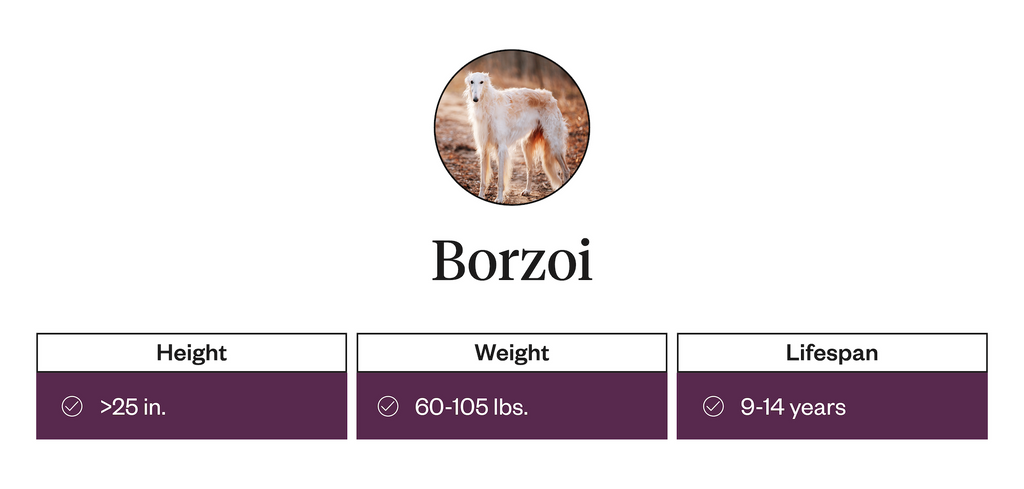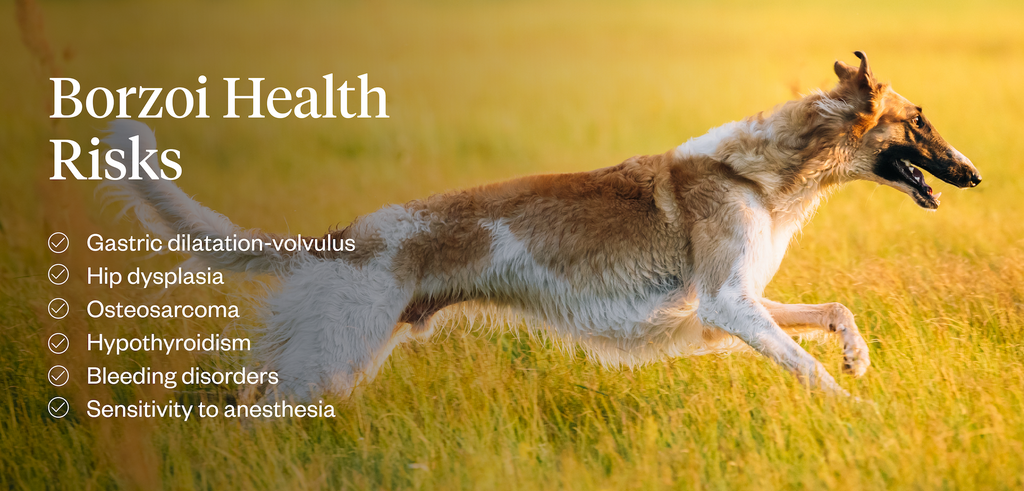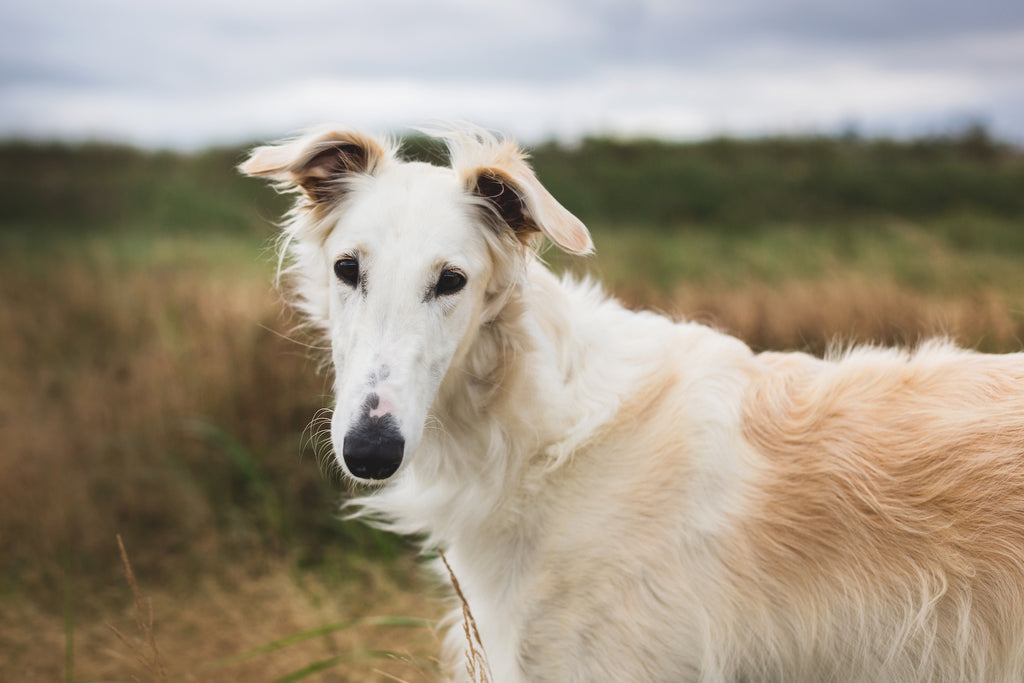8 Min Read
Borzoi: Pet Profile
Key takeaway
The Borzois breed is a sighthound that originated in kennels owned by Russian nobles. These dogs were once used to hunt wolves, and they’re known for their speed, strength, and intelligence. Borzois are susceptible to many of the same health issues as other large breeds. With proper training and care, Borzois make great pets.

Why pet owners are switching to online vet care with Dutch
-
Prescriptions delivered free to you
-
Fast access to Licensed Vets over video
-
Unlimited video visits and follow-ups
The Borzoi is a type of hunting dog that’s referred to as a sighthound. While many dog breeds hunt using their strong sense of smell, sighthounds rely heavily on their sight and speed to hunt. Other examples of sighthounds include whippets and greyhounds.
Borzoi dogs can make great companions when trained properly, but training can be difficult. There are also certain health problems that affect Borzois, including hip dysplasia and hypothyroidism.
If you’re considering a Borzoi for your next pet, there are a few things you should know before you make that commitment. Learning about Borzois can help you calculate the costs of pet ownership and prepare for your new furry friends. Here’s what you need to know.
- History & Origin Of Borzois
- Physical Attributes Of The Borzoi
- Behavioral Characteristics Of The Borzoi
- Borzoi Health Risks
- Caring for Borzoi Dogs
- Borzois: FAQs
- Final Notes
History & Origin Of Borzois
The Borzoi is a type of hound dog that was developed in Russia to be a hunting dog. Borzoi dogs are descendants of Arabian greyhounds and Russian sheepdogs. This breed was originally called the Russian wolfhound because of its strong stature and agile nature.
Borzoi is one of the older domestic dog breeds, with Russian nobles breeding and raising them hundreds of years ago. In these times, Borzois were used along with foxhounds to hunt wolves. The hunting prowess of the Borzoi is a result of speed and strength, a key distinction between sighthounds and scent hounds.1
While Borzois were almost exclusively owned by Russian nobles at one time, that changed during the Bolshevik Revolution. When kennels were disbanded, Borzois were rescued by hunters and citizens. The eventual Borzois population came from these disbanded kennels and the descendants of Borzois that were given as gifts.1
Physical Attributes Of The Borzoi

Borzois are somewhat similar to greyhounds in appearance. Like greyhounds, Borzois have aerodynamic features that make them great at running and chasing wild game.
The average Borzoi male is about 28 inches at the withers, with females standing at about 26 inches. Males range from 75 to 105 pounds, with females being 15 to 20 pounds lighter.
Borzois have long, narrow heads that sort of resemble a greyhound. The ears are similar as well but with longer hair around the area where the ears and head meet. A narrow body with fine shoulders makes the Borzoi even more aerodynamic, a big reason they were once coveted wolf-hunting dogs.
Despite being long and lean, Borzoi dogs are also very muscular and strong. When Borzois would catch a wolf during a hunt, they would pin them down by the neck and hold them there until the hunters arrived. This muscular appearance is most noticeable in the loins and hindquarters.
Unlike greyhounds, Borzoi dogs have longer hair that’s more reminiscent of a Samoyed or collie. There are several potential colors and color combinations.
Behavioral Characteristics Of The Borzoi
Like many hunting or working dogs, the Borzoi is sought after for several of its behavioral traits. Borzois are calm and gentle,1 which makes them a great choice for families with children. They also make good watchdogs, although they’re more bark than bite.
Borzois love to be entertained, and their favorite entertainment comes in the form of anything that involves running. Borzois are happy when they have wide open spaces where they can stretch their legs and be active, so this isn’t the best breed if you live in a more confined area. Because they’re hunters, Borzois will chase different types of small animals for entertainment.
While Borzois are generally pretty calm and well-behaved dogs, they have a fun side to them as well. Borzois love to play, and they may have a difficult time following obedience training because they’re smart and independent. That being said, Borzois can respond well to obedience training — especially if you make it entertaining for them.
Since Borzois love to run and be active, agility training can be a good fit. Borzoi dogs excel at running and jumping over obstacles, and running around keeps them entertained. Agility training is a great way to keep your Borzoi active and entertained, and it also gives you quality bonding time with your dog.
Borzoi Health Risks

There are certain health risks you should know about before you decide to get a Borzoi. Borzois are at risk for several medical conditions, including hip dysplasia, osteosarcoma, and hypothyroidism.
Canine gastric dilation-volvulus (GDV) can be life-threatening, and it typically affects larger dog breeds like Borzois.2 Treatment for GDV typically involves surgical procedures, and the condition can be life-threatening without early intervention.
Hip dysplasia is a deformation of the hip that’s common in certain dog breeds. Hip dysplasia causes instability in the hip joint, which can lead to limb dysfunction and pain. Genetics are the biggest risk factor for canine hip dysplasia,3 and Borzoi is one of the high-risk breeds. Inactivity due to hip dysplasia can lead to complications as a result of overfeeding and a lack of exercise.3
Osteosarcoma is a malignant bone tumor that occurs in thousands of dogs in the United States each year.4 While osteosarcoma can affect any breed, it’s more prevalent in large and giant dog breeds than in smaller breeds.4 Being a larger breed, Borzoi dogs are at higher risk for osteosarcoma.
Certain bleeding disorders can be inherited in dogs, and they can go undiagnosed until surgery or a severe injury. DNA blood testing can be used to check for Von Willebrand’s disease and other bleeding disorders prior to surgery, which is a crucial step if you have a Borzoi.5
Hypothyroidism can occur in Borzois, and you may notice symptoms including hair loss, weight gain, and behavioral changes. Annual blood tests can help you detect hypothyroidism in Borzois.
Borzois are also sensitive to anesthesia, which can make certain procedures complicated.6 Choosing a vet or surgeon who knows how to work with Borzois is key.
Caring For Borzoi Dogs
Borzoi dogs require special care, but they’re great dogs when you take good care of them. You can learn more about some of the unique needs of Borzoi dogs below.
Diet & Nutrition
Dogs are omnivores, which means they eat a mixture of plant and animal-based foods. You can make your own dog food at home with the help of your vet, or you can talk to your vet to make sure you’re choosing a good dog food brand. A healthy diet should include amino acids, fatty acids, and lots of protein.
Since Borzois are a large breed, they need more food than smaller breeds. You should feed your Borzoi based on their weight — 70-pound adult active dogs need about 1,740 calories and 90-pound dogs need about 2,100 calories.7 Overfeeding can be especially harmful for large breeds.
Grooming
Grooming is one of the most important parts of taking care of your Borzoi because they have a longer coat. Unlike short-haired dogs, Borzois should be brushed two to three times a week. Your Borzoi will also shed their coat during the warmer months.
Like any dog, Borzois need all the standard grooming. Your Borzoi dog needs nail trimming, paw care, monthly ear cleanings, and eye care. To keep your dog’s teeth healthy, you should brush them at least once per day — although twice is ideal. Regular brushing helps prevent gum disease in dogs.
Exercise & Enrichment
Borzoi dogs love to run, so exercise and activities are essential parts of owning a Borzoi. If you live in a confined area, owning a Borzoi may be difficult. Ideally, you want a large space where your borzoi can get ample exercise.
Since Borzois love to run and play, they usually respond well to agility training. You can set up a course at home and run your dog through it to give them some exercise. Like any dog, Borzois also enjoy different types of toys and lick mats to keep them stimulated and entertained.
Preventative Care & Veterinary Check-Ups
Preventative care is key when it comes to larger breeds. You should take your Borzois to the vet once a year for a routine check-up, which helps you monitor the weight and overall health of your dog. Your vet can also help you test for medical conditions and get an early diagnosis, so you can get your canine the treatment they need as early as possible.
Flea and tick prevention can help keep your Borzoi’s skin healthy and prevent flea-borne illnesses. Preventative medications like NexGard chewables and Credelio can help you prevent fleas and ticks.
Borzois: FAQs
How fast are Borzois?
The word “Borzói” is the masculine singular form of an old Russian adjective that means “fast.” These dogs were used by early Russian hunters to chase down wolves, which required incredible speed, agility, and strength. The Borzoi can reach a top speed of about 35 MPH, making them one of the faster dog breeds.
Are Borzois aggressive?
Borzois aren’t typically aggressive, but temperament can vary depending on the dog and its environment. Socialization is an essential part of making sure your dog gets along with people and other dogs. If they’re trained well, Borzois can be an excellent family dog.
Are Borzois rare?
Borzois are relatively rare because of their unique history. In the United States, Borzois are coveted by certain breeders as one of the very best dog breeds.

Final Notes
The Borzoi is a beautiful sighthound that loves to run and hunt. Borzois are generally smart and well-mannered, and they’re great if you’re into agility training or have a large space for your dogs to run. With proper training, Borzois make excellent pets.
Taking care of a Borzois can be a little overwhelming, but Dutch can help. Telemedicine for pets allows you to connect with vets through video chat and get pet prescriptions online. If you want to take better care of your pets, try Dutch and find out what you’ve been missing.
Share
References
-
Hill's Pet Nutrition. "Borzoi Breed Information," https://www.hillspet.com/dog-care/dog-breeds/borzoi.
-
National Center for Biotechnology Information (NCBI). "Canine Hip Dysplasia: A Review," https://www.ncbi.nlm.nih.gov/pmc/articles/PMC7694454/.
-
American College of Veterinary Surgeons (ACVS). "Canine Hip Dysplasia," https://www.acvs.org/small-animal/canine-hip-dysplasia/.
-
American Kennel Club Canine Health Foundation (AKCCHF). "Understanding and Managing Hereditary Hip Dysplasia in Borzois," https://www.akcchf.org/research/research-portfolio/0373.html.
-
Cotter, Susan M. Merck Veterinary Manual. “Bleeding Disorders of Dogs.” https://www.merckvetmanual.com/dog-owners/blood-disorders-of-dogs/bleeding-disorders-of-dogs/
-
Kennedy, Martin J. and Smith, Lesley J. Veterinary Practice News. "Canine Breed-Specific Considerations for Anesthesia." https://www.veterinarypracticenews.com/canine-breed-specific-considerations-for-anesthesia/.
-
National Academies Press (NAP). "Nutrient Requirements of Dogs and Cats," https://nap.nationalacademies.org/resource/10668/dog_nutrition_final_fix.pdf.



